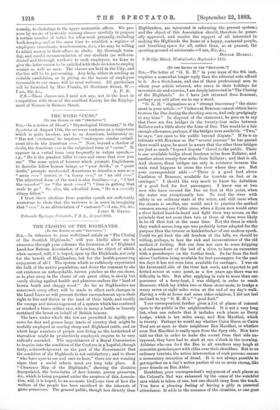THE WORD "CUSS."
[To THE EDITOR OF THE "SPECTATOR."] SIR,—In a review of Skeet's "Etymological Dictionary," in the Spectator of August 11th, the reviewer ventures on a conjecture which is quite baseless, and to an American, ludicrously so. "Has not 'customer,' he inquires, "undergone similar curtail- ment also in the American cuss ?" Now, beyond a shadow of doubt, the American cuss is the vulgarised form of " curse." It appears in a verbal form very frequently in vulgar speech,- e.g., "He is the greatest feller to cuss and swear that ever you see." The same spirit of humour which prompts Englishmen to describe fellow human beings as "poor devils," or "queer devils," prompts uneducated Americans to describe a man as a "mean cuss" (curse), or "a funny cuss," or "an odd cuss." The adjectival form of the word is also familiar,—e.g., "I bad the cussedest" (or "the most cussed") "time in getting that mule to go." So, also, the adverbial form, "He is a cussedly stingy fellow."
I trust these citations from popular speech are sufficiently numerous to show that the reviewer is in error in imagining that "cuss" is an abbreviation of " customer."—I am, Sir, &c., JAMES B. GREGG.
Colorado Siwings, Colorado, U.S.A., August 30th.


































 Previous page
Previous page